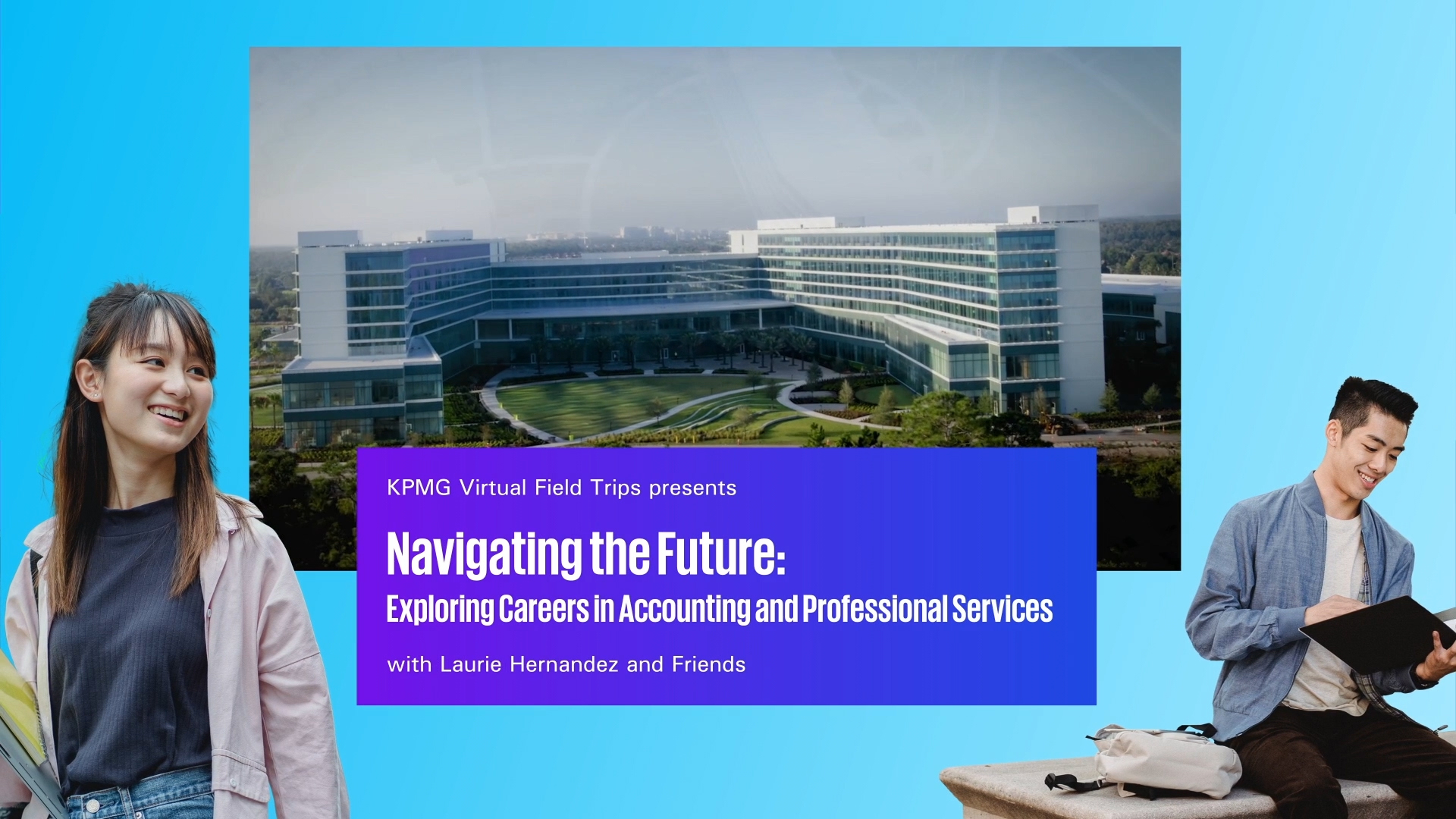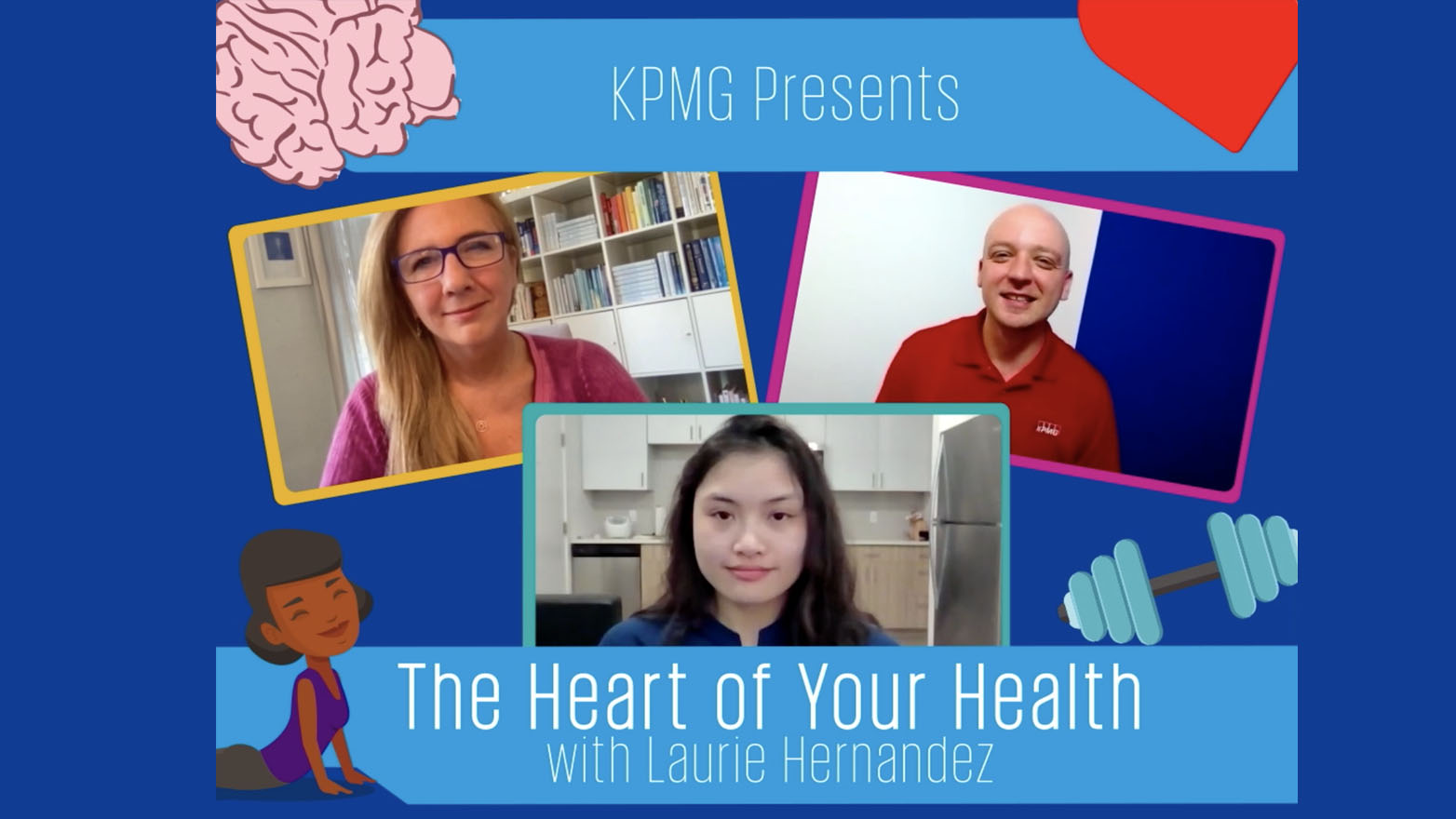Navigating the Future: Exploring Careers in Accounting and Professional Services | Video transcript
Laurie Hernandez:
Hey there. My name is Laurie Hernandez. I'm an Olympic gold medalist for Team USA, a KPMG learning ambassador, and a current college student. Attending college, selecting a major, and choosing a career are all important decisions you may be faced with. When there are so many possibilities to take in, it can be helpful to learn more about the range of options you can explore.
There are so many different jobs within public accounting and professional services. You may not be aware of all the opportunities if you've never met an accountant or a consultant. I was surprised to learn just how dynamic and innovative accounting is, which is often referred to as the language of business.
Today we'll be visiting my friends at KPMG to explore what a career in this field can look like. Come along with me as I meet with KPMG professionals who will share more about their roles and the benefits of a career in public accounting and professional services. We'll even get to explore KPMG Lakehouse and hear firsthand from a past KPMG intern. The ability to gain an understanding of the different career possibilities is so important for young people like me and you.
So without further ado, this is KPMG Virtual Field Trips. Let's get started.
Sherry Magee:
Hi, Laurie.
Laurie Hernandez:
Hi.
Sherry Magee:
Welcome to Lakehouse. We're so happy to have you here today.
Laurie Hernandez:
This is incredible. What is Lakehouse and why was it built?
Sherry Magee:
Lakehouse is our cultural home. We are an 800 room state-of-the-art learning and innovation campus with 800,000 square feet of meeting and classroom spaces, a dining hall, and recreational spaces. It's our place for our people to develop new skills, connect with each other, explore new ideas, and all the while focusing on their physical and mental wellness.
Laurie Hernandez:
Amazing. It sounds like a great place to reflect, reconnect, and grow.
Sherry Magee:
Exactly. Laurie, I'd love for you to meet my colleague, Amy. She works with students on college campuses across the country and can tell you all about the different opportunities that exist here at KPMG.
Laurie Hernandez:
Okay. Let's start with a few questions. Can you tell me about KPMG?
Amy Korner:
KPMG is known for public accounting. It's at the core of what we do. Public accounting firms like KPMG review and assess the accuracy of the financial statements of the largest companies in the world to be sure that they're reporting their numbers correctly. KPMG also provides several other services to businesses that we like to call professional services. Over our 125-year history, we've recognized the complex needs of our clients, leading us to expand our services to include things like tax guidance, technology, and consulting services.
Laurie Hernandez:
Very cool. You mentioned accounting. What can you do as an accountant?
Amy Korner:
Essentially, accounting is what businesses use to help keep track of their money. It's a way to measure how well a business is doing, where it can improve, and how to succeed. In other words, it's like a report card for businesses. Accounting is a core function in the way that businesses work today and is a high demand job in every industry.
Are you interested in STEM? Accountants are needed to help forecast plan for product launches and innovation. Interested in the entertainment industry? Accountants make concerts, record drops, and movies possible.
Laurie Hernandez:
What college major would make sense for someone to work at KPMG?
Amy Korner:
KPMG employees have a wide range of knowledge, which is part of what makes this such a diverse place to work. Our employees have majored in everything from accounting, business analytics, to engineering, computer science, finance, and economics. Whatever your degree, your skills and expertise can help you succeed in this industry. KPMG also offers careers in marketing, human resources, supply chain, AI, cyber security, and so much more.
Since you love meeting new people, I'd like to formally introduce you to Susannah, who works in our audit practice.
Susannah Hochuli:
Nice to meet you, Laurie.
Laurie Hernandez:
We're looking to pick your brain on your career journey and experience. How does that sound, Susannah?
Susannah Hochuli:
Yeah, of course.
Amy Korner:
Awesome. Okay. Can you describe what you do on a day-to-day basis?
Susannah Hochuli:
As an auditor, I get assigned to work on a client as part of a team. I might go to client offices and look at some of their financial records just to make sure that everything is accurate and follows the rules, and that's really important, especially for those public companies where the people that invest want to make sure that the information is correct and that their investment is protected. I have helped with initial public offerings before, which is called an IPO, and it's when a company wants to raise money. So what they do is they decide to sell shares of their company to the public, and then those investors own part of the company.
Amy Korner:
What's your favorite part of working in this field?
Susannah Hochuli:
No day is the same. Working with clients across different industries, like fashion labels, car brands, airlines, big banks, it always keeps things interesting, and then getting to see the behind the scenes of some of my favorite companies is really cool.
So one of the great things about working here at KPMG is the opportunity to help not only our clients, but also our communities. So there's a number of different ways to get involved. One of the things that I did is I actually took a six-week rotation with our community impact group where I was able to help high school students and I was able to help coach and mentor them in their professional development.
We also, as a firm, participate in Community Impact Day where nationwide, everyone goes out and helps to serve their communities, which is a great opportunity to give back and also connect with your co-workers outside of the office.
Laurie Hernandez:
What is the most unique place your position has taken you?
Susannah Hochuli:
Yeah, so during one of my internships in college, I had the opportunity to live and work in Perth, Australia which, fun fact, is known as the most isolated big city in the world, and it was a great opportunity to meet and work with people from all over the world. Some of those colleagues now work in New York City, so it's been really fun to be able to reconnect with them and have that global network.
Amy Korner:
Thank you so much for sharing your experience, Susannah. This has been terrific.
Susannah Hochuli:
It was great to talk to you both.
Amy Korner:
Hey, Laurie, you interested in seeing more of Lakehouse?
Laurie Hernandez:
Yes, let's do it.
Wow. This office is amazing. Does KPMG have offices located anywhere else?
Amy Korner:
We do. KPMG has over 650 offices in 147 countries worldwide, and over a hundred in nearly every state across the US.
All right, you ready to meet our next special guest?
Laurie Hernandez:
Yes.
Amy Korner:
Laurie, meet Ricky, a senior associate from our advisory team.
Ricky Hejibu:
Hey, Laurie, it's great to meet you. How can I help?
Amy Korner:
Do you think you could describe your role at KPMG and what a typical day might look like for you?
Ricky Hejibu:
Absolutely. As a member of our strategy analytics team, I work with clients to organize all of their data. Many of our clients are car companies that sell and produce cars all around the world. They have a lot of information to manage and they need our help staying organized. It's amazing how useful this information can be for clients to make decisions on things, such as materials they need to buy or what type of products they sell best.
Early in my career at KPMG, I did have several mentors that helped show me the ropes within consulting. One of the first clients I worked with is actually one of the largest car producers in the world. So having that type of exposure to such a large company with experienced leadership and to see the ins and the outs of that particular company definitely gave me a very good basis of understanding for what some of the clients that we work with are like.
Amy Korner:
What are some of the types of positions available within consulting?
Ricky Hejibu:
I would say one of the growing trends is artificial intelligence, or AI for short. It's been a growing part of our business and we have teams that use and develop AI tools to create solutions that can improve our client's products. AI is already changing how we work and live, like suggesting the music we listen to, or the shows that we watch, by learning what we like.
Amy Korner:
What is the best thing about working for KPMG?
Ricky Hejibu:
So the great thing with working at KPMG is that you're constantly learning. There's always more things to improve on. There's always a variety of work that you're not going to be bored with ever. I also love that KPMG encourages employees to volunteer with the community. Using my data and analytics skills, I've provided consulting services to nonprofit organizations, so it was pro bono projects that the organizations did not have to pay for.
Amy Korner:
Thanks for all of these great insights, Ricky.
Our next guest is currently a tax associate at KPMG, and she got her start as an intern through our KPMG Embark Scholars Program. She'll be able to speak about what it's like to work in tax at KPMG and how she got here.
Laurie, meet Ayanna.
Laurie Hernandez:
Hi, Ayanna.
Ayanna Harris:
Laurie, great to meet you. I'd be happy to share anything you'd like to know about my experiences.
Amy Korner:
What is KPMG's tax practice?
Ayanna Harris:
Just like your teachers and parents might hire an accountant to help them file their taxes, we do the same, but for large companies. Our tax professionals are like trusted advisors to our clients, helping them make sure they're doing their taxes right, avoiding penalties for mistakes, and discovering savings.
Amy Korner:
I understand you were an intern before you joined the tax practice. What was that like?
Ayanna Harris:
Yes. I had a great experience as an Embark intern. The KPMG Embark internship was a great program that allowed me to learn about the different sectors within the firm: tax, audit, and advisory. I also had the ability to meet several different amazing professionals throughout my time here.
Amy Korner:
What are some skills you gained during your Embark internship that helped your career?
Ayanna Harris:
The KPMG internship helped me prepare for my career because it gave me the opportunity to learn how to network. It made it that much easier once I got into the firm in my actual career to step out of my comfort zone and actually talk to people, ask them out to go for coffee, to ask questions, things of that nature.
Laurie Hernandez:
What advice would you give to students who are considering applying for an internship?
Ayanna Harris:
I say go for it, and I say go for it with an open mind, to learn as much as you can learn and meet as many different professionals as you can. You don't know what you like until you educate yourself on it, until you learn about it, until you seek out other professionals and ask them their day-to-day tasks. So I definitely think it's worth seeking out other things outside of what you think you might like, or what you feel like you like in that moment.
Amy Korner:
Thanks for all that awesome info, Ayanna.
Ayanna Harris:
You're welcome. It was great meeting you, Laurie and Amy.
Amy Korner:
Bye, Ayanna.
Laurie Hernandez:
Bye, Ayanna.
It was really interesting to speak with Ayanna and hear how she got her start in the field.
Amy Korner:
Absolutely.
Once you have an idea or interest to pursue, it's all about taking baby steps in the right direction. Before you know it, you're on a career path.
Laurie Hernandez:
Okay, so now my mind is buzzing a bit. Amy, do you think you can give us a quick review on everything we went over today?
Amy Korner:
It would be my pleasure. There are so many benefits to a career in public accounting and professional services, like generous pay, travel, continuous education and training, and working with really interesting clients. Getting started can be a little daunting, but if you look to answer questions about yourself and determine your path, little by little, you'll be on your way. If there are local community colleges or universities nearby, you may be able to connect with a professor to learn more about a specific subject or major. On that note, think about a college major. If you're interested in a particular job, what's the most common major for people who do that job? What's your best subject, and what's your favorite subject? These questions can help you figure out how to choose a college major.
And finally, be sure to explore internship opportunities. You can gain hands-on experience in your field of interests, and it'll really help build a strong resume.
We encourage you to check out our careers page at the website below to learn more.
Laurie Hernandez:
What a great recap. We have learned so much today. This time in your life can be very exciting and nerve-wracking at the same time. You can start thinking about a direction for your career by considering your interests and how the skills you've already developed could connect you to a potential career. I want to reassure you that you are capable of anything, you have tremendous potential, and there's a home for everyone to launch their career in this field and others. I can't wait to see the people you'll become.
To learn more about the education efforts of KPMG, please visit kpmg.us. Thank you so much for watching.



